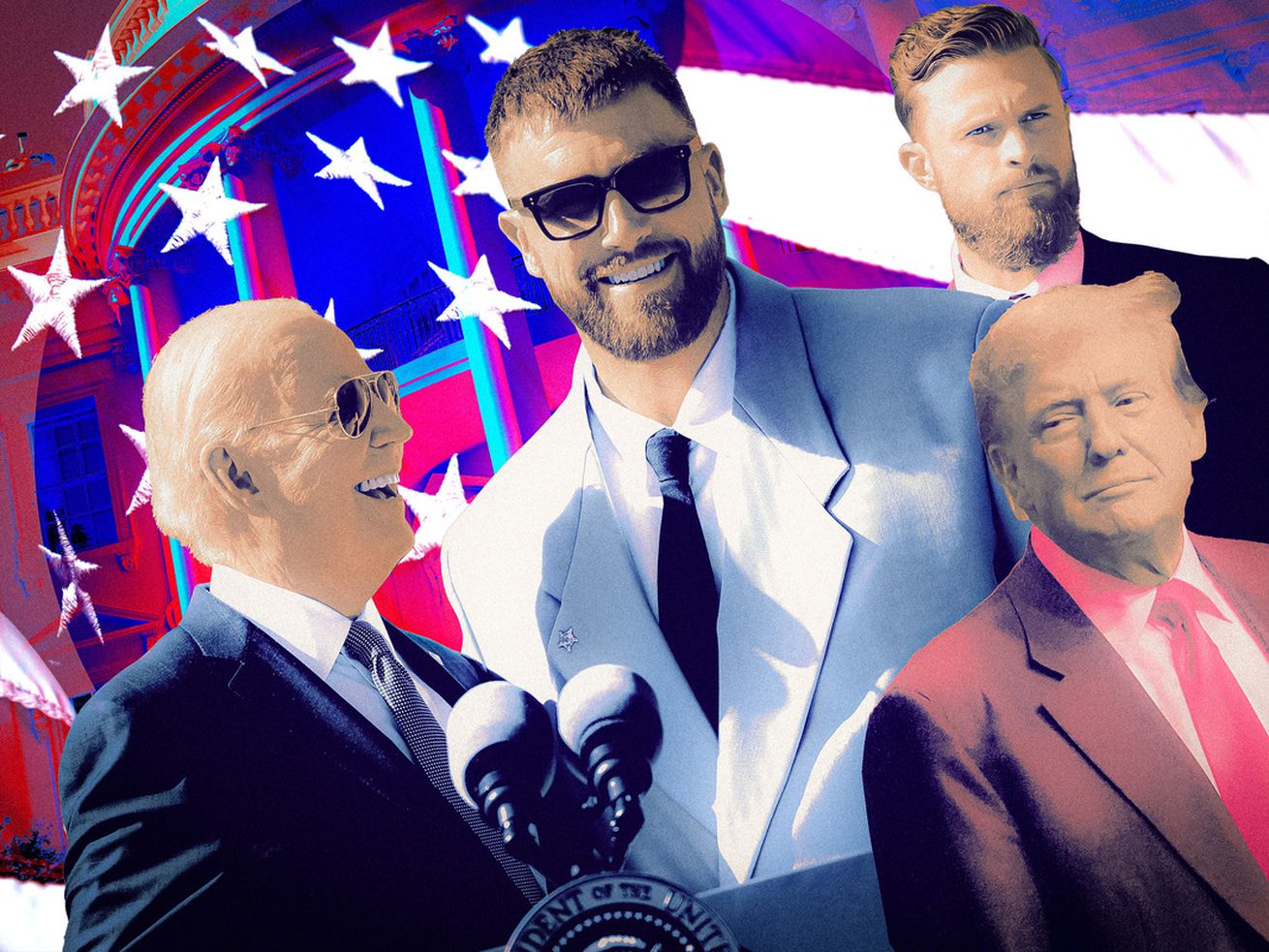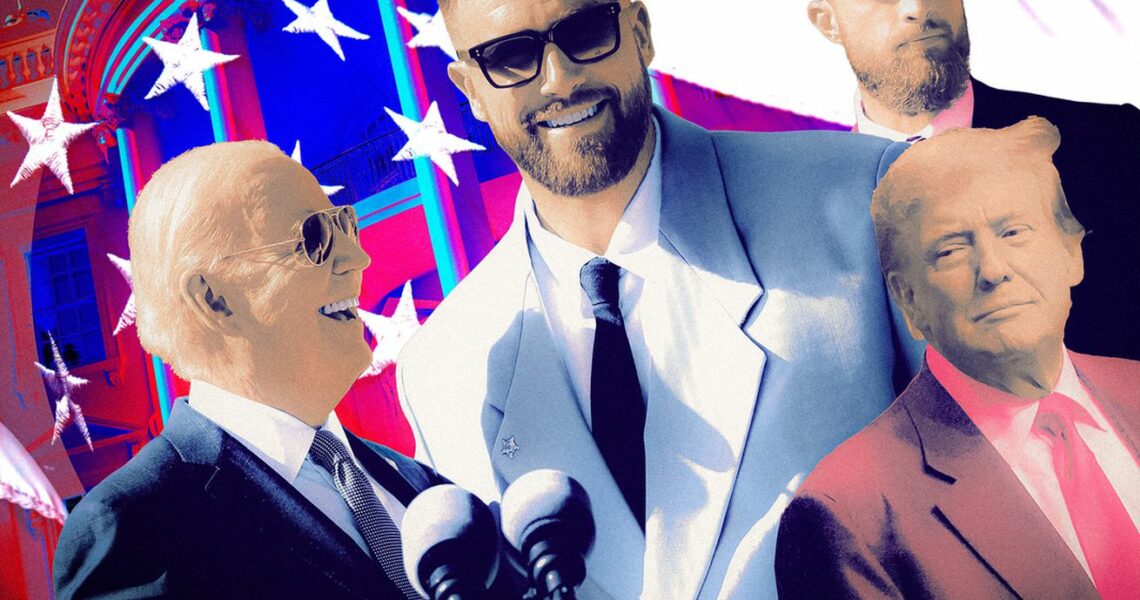
The Kansas City Chiefs just visited the White House. It might not be the only time football and politics collide this year.
The sun was strong over the South Lawn of the White House last Friday afternoon, as the Chiefs filed out of the West Wing and into rows underneath the South Portico. It was a day for suits and ties but, after back-to-back Super Bowl wins, this traditional visit by the NFL champions to see the president was familiar as well as formal. President Joe Biden, who welcomed Kansas City to the White House, joked around with tight end Travis Kelce who, at last year’s visit, caused a minor ruckus by pretending to start an unauthorized speech.
“I’d have Travis come up here,” Biden said from a lectern in front of the players, “but God only knows what he’d say.”
Kelce played along and stepped, for a moment, up to the microphone. “I’m not going to lie, President Biden,” he said. “They told me if I came up here I would get tased.” Biden chuckled, and much of the crowd on the lawn—a mix of politicians from Kansas and Missouri, invited fans, White House staffers, and press—cheered. Before the Chiefs left, the United States Marine Band played them off their risers with a cover of Queen’s “We Are the Champions,” before shifting into “Viva Las Vegas,” a winking homage to Kelce’s boisterous celebration after February’s Super Bowl in Nevada.
There are many marks of a football dynasty, shared bits with the president of the United States among them. But while White House visits may be becoming routine for these Chiefs, the context around this one was distinct. Kansas City, like any other NFL franchise and like the league itself, likes to appear apolitical—despite the fact that many team owners, the Chiefs’ Clark Hunt included, are major political donors and the league itself has an active PAC—but football and national politics could be on a collision course heading into an election year. Remaining apolitical will be harder than ever, especially for the Chiefs.
This was the Chiefs’ first White House visit during an election year. The Chiefs won Super Bowl LIV four years ago, but their visit to former president Donald Trump’s White House was canceled after the onset of the pandemic. This time, their trip came on the day after Trump was convicted by a New York jury on 34 felony counts of falsifying business records, a seismic event with untold political consequences that Biden had addressed publicly for the first time shortly before meeting with the Super Bowl champs.
The trip is part of a Chiefs offseason that’s been heavy on off-the-field controversy. A few weeks earlier, kicker Harrison Butker delivered a commencement address at Benedictine College in Kansas, in which he described Pride Month as a manifestation of “the deadly sins,” told women graduates that one of the “most important titles” in their lives would be “homemaker,” and called Biden “delusional.”
If there was any tension in glossing over all that at the White House event, it was subtext, not text. It was a gorgeous day. I watched the festivities from the South Lawn, where lemonade was served and staffers in their business attire hunted down shade. Biden said nothing of the election other than that he liked the idea of “winning back-to-back.” Butker did attend, and stood in the back row looking relatively stoic, but not glum. The entire ceremony, including speeches by Biden and Hunt, as well as time for photos, ran about 30 minutes. Near the end, Hunt and coach Andy Reid presented Biden with a Chiefs helmet, which Biden put on his head. Most players cheered and chanted, “Do it! Do it.” (Butker was still but smiling.) The kicker didn’t linger for photos, but stopped along a rope line on his way out to sign a couple autographs, thanking one man who said something in Butker’s ear. In his speech, Biden commended the Chiefs’ general manager, Brett Veach, Kansas City’s offense for persevering through a difficult regular season, Patrick Mahomes’s penchant for comeback wins, Reid’s game management, coordinator Steve Spagnuolo’s defense, defensive lineman Chris Jones’s play, and the team’s multiple All-Pro and Pro Bowl selections. Biden described watching overtime of the Super Bowl while aboard Marine One. If you wanted to read into the fact that he made no mention of the record-setting 57-yard field goal that gave the Chiefs their margin of victory in the game, I suppose you could.
When Hunt spoke, he focused on football as a connector.
“There is a lot that can divide us today,” he said. “But for so many of us, sports provide a unifying joy that we all need.”
It’s a nice sentiment. Still, Hunt’s position—that the NFL is a space for differently-minded people to find unity—feels particularly tenuous at this moment. Sports has never existed free of politics and, recently, the NFL has seemed to be inching closer to the center of several politically charged debates, from Jets quarterback Aaron Rodgers’s conspiratorial thinking about vaccines and the National Institutes of Health, to Butker’s extreme stances on abortion and rejection of women’s and gay rights, even to the league’s intersection with Taylor Swift, who is an unlikely but enduring political lightning rod. Rodgers having been floated this spring as a possible vice presidential candidate for independent Robert F. Kennedy Jr.’s campaign felt like another potential harbinger.
The last time the NFL was a battleground in the culture wars was 2017, when many players, following the lead set by then-49ers quarterback Colin Kaepernick a season earlier, protested police brutality during the national anthem, leading to attacks from Trump and, for a time, contentious national debate. But for as hot as that issue was, it did cool off—broadcasts stopped showing the sidelines during the anthem, the league partnered in philanthropy with the more institutionally friendly wing of player protesters, and things died down.
The NFL surely doesn’t want to be back in the political fray, and maybe it won’t be. The league’s instinct in responding to controversy tends to be to minimize and disengage. Butker’s speech was met with boilerplate dismissal, both from the NFL—chief diversity and inclusion officer Jonathan Beane said in a statement that “[Butker’s] views are not those of the NFL as an organization”—and from the Chiefs. Reid said he didn’t think Butker was “speaking ill to women,” and that “he has his opinions and we all respect that.” Mahomes said he knew Butker as “a good person.” Kelce, in an odd position as the most public spokesman for his team largely because of who his girlfriend is, said on his podcast that he doesn’t agree with “just about any” of what Butker said, but that he could not judge him for his views and does “cherish him as a teammate.” (The Hunt family line was a bit more defensive of Butker—Clark Hunt’s wife, Tavia Hunt, posted on her Instagram account that “affirming motherhood and praising your wife, as well as highlighting the sacrifice and dedication it takes to be a mother, is not bigoted”; their daughter Gracie appeared in a segment on Fox & Friends in which she said she understood what Butker meant and spoke of her own “formative” experience growing up with a stay-at-home mom.)
But the limit does exist to what the NFL can swat away. And if the Chiefs’ growing dynasty is the league’s biggest football story, Kansas City also seems the team most at risk of becoming a political football.
They have struggled to avoid controversy in general this offseason, from Butker’s comments to receiver Rashee Rice’s arrest on multiple charges after police said he caused a six-vehicle crash, resulting in injuries to multiple people, while street racing a Lamborghini. The Chiefs fared poorly on the NFLPA’s annual survey in March, in which players described the organization as penny-pinching just as it was lobbying the public to devote money to stadium improvements, which Jackson County, Missouri, voters resoundingly decided against. Also in March, Missouri Governor Mike Parson commuted the sentence of former assistant coach Britt Reid, who is Andy Reid’s son. Reid had been sentenced to three years in prison after pleading guilty to a felony charge of driving while intoxicated, following a 2021 crash that injured six people, including a 5-year-old who suffered severe brain damage, but was let out on house arrest after less than half of his sentence. Last month, two other Chiefs players, offensive tackles Wanya Morris and Chukwuebuka Godrick, were both arrested for misdemeanor marijuana possession.
All of this exists in a spotlight brightened by their team success, by Mahomes’s stardom, and by Kelce’s increasingly large public presence, tangential as it may be. So as the team celebrated its Super Bowl championship at the White House, two questions came to mind. Can they get back to that ceremony next year? And can they wave off political attention until then?

